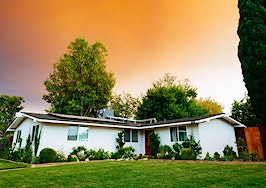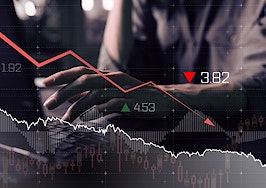The COVID-19 pandemic has radically impacted the economy in ways that are still unfolding. But how has it affected — or will continue to affect — the real estate industry?
Some experts say it will accelerate the urbanization we’ve seen over the previous decade or two, as people have moved into cities and driven up prices in urban cores. Others predict a reversal of this trend, with families, spooked by density and rioting, abandoning cities and buying homes in suburban and even rural areas.
With the country taking its first tentative steps out of quarantine, experts on both sides can point to facts backing up their theory — though, at this point, one side has a little more evidence than the other.
A recent Wall Street Journal article described families fleeing locked-down New York and, in some cases, buying houses in the suburbs the very same day. Of course, most people don’t have the means to see a house sporting a for-sale sign from the car, hop out and buy it on the spot (as one couple in the story does), but the impulse is probably not all that rare.
A New York Post piece from late April quotes the founder of a “real estate advisory and tech platform” called Suburban Jungle that helps families move from the city to the suburbs. Demand for its services is up 40 percent, year over year.
The latest numbers show this exodus has only picked up speed. A report from UrbanDigs in late May found increased demand in suburban areas outside NYC. Westchester County saw a 22 percent jump in demand. Greenwich, Connecticut, saw a 65 percent jump, and New Jersey’s Bergen and Monmouth counties saw increases of 21 percent and 22 percent, respectively.
At the same time, Manhattan saw a precipitous 56 percent drop in interest. And a piece in The Guardian from mid-June described city dwellers snapping up suburban properties after just a video tour. For now, at least, a lot of people are leaving cities.
The question is, will it stick? To some extent, movement between the city and the suburbs is a cyclical thing. Google “Wall Street Journal article about people moving to suburbs,” and you’ll see that it published pieces about this “new” phenomenon in 1999, 2010 and 2019.
As each generation eases into middle age, it’s natural they’d want more space and a quiet environment for their families. But every once in a while, this flight is caused by external events. After 9/11, many people left New York and settled in the surrounding suburbs. Most of them came back eventually, but who knows if the same reversal will happen post-pandemic, or if they’ll even have the choice?
Experts estimate that half of all small businesses could fail, and many of those businesses are in cities. People who return to urban cores after the pandemic has run its course may not even recognize the city they left.
And if the boutiques and coffee shops that drove the last decade of reurbanization are suddenly gone, how many people will still be willing to pay top dollar to live in a place suddenly denuded of charm?
That said, not everyone is so gloomy about the future of the American city. A recent piece from a University of Texas professor makes a strong case that the pandemic will actually accelerate urbanization, at least in his home state of Texas.
His reasoning is simple and hard to argue with — cities have most of the vital resources, like health care facilities, that people are going to value most highly post-pandemic. Stories about small town hospitals with very little capacity will make people want to live in cities even more than they do now.
And, maybe most persuasively, cities are the engines of the economy, and in a post-pandemic economy focused on recovery, cash-strapped consumers in need of jobs will simply follow the money.
Rents and home prices in a post-pandemic America
The real estate industry wasn’t necessarily hurt by the pandemic; it was just on pause. Open houses were banned in most states, and many sellers yanked their listings when lockdowns began.
Demand didn’t go anywhere, though. Markets like Washington, D.C., have already set record prices as they rev back up, and a lot of the country looks well-positioned for a similar rebound. One analyst predicts that 2020 home sales will be down 14 percent for the year, but that home prices will inch up anyway. As is characteristic of real estate, local markets will vary.
Most analysts agree that the higher end of the market will see some significant softening. Most of the construction recovery since the 2008 financial crash has been concentrated in the luxury market, so there’s a tremendous amount of high-end inventory coming online.
But the pandemic recession is going to reduce the pool of high-income renters. The intersection of these two trends will likely bring prices down at the top of the market.
Widespread economic pain could also bring rents down in the rest of the market, as it already has in Los Angeles, which in April recorded falling average rents for the first time since 2010, and then followed that up by recording a further 3 percent drop in May. And if falling rents make landlords rethink their return on investment, a wave of selling could lead to a more widespread price drop in urban markets.
So what about home prices in the suburbs, especially if they see the predicted influx of families fleeing cities? It’s more of a mixed bag there. While housing inventory is very low, overall, housing is always going to be much more scarce in the city than in the suburbs.
After all, that’s the fundamental reason city dwellers tend to migrate to the suburbs when they’re looking for more bang for their buck. The suburbs will be able to absorb quite a bit of increased demand without seeing prices spike dramatically.
The suburbs are much more uniform, too, which insulates them against too much price volatility. The aesthetic homogeneity cited by so many critics of suburbia creates an unusually stable market.
There’s a reason that iBuyers, which rely on algorithms and data analytics to appraise homes en masse, have had so much success in the suburbs, especially in the South and the Southwest. Not only is there a lot of housing inventory there, it’s all quite uniform.
Unlike in cities, where varying levels of amenities can create huge price swings from block to block, the suburbs present a predictable, easy-to-appraise product — and lots of it. To put it another way, why would a potential buyer get into a bidding war over any one suburban house, when they can simply put in an offer on an identical one on the next block?
If there’s an exodus to the highly defined suburban market, we could also see an acceleration of the rise of discount agents that mirrors the suburban iBuyer takeover. Sellers in a predictable market, with more diffuse demand, may not want to pay 6 percent commission on a frictionless transaction when they can get the same outcome for half that.
Still, while there will be price fluctuations in different tiers of the market, some up and some down, buyer demand didn’t evaporate; it was just biding its time.
While a Clever survey from late April found that prospective buyers were 5.5 times more likely to put a hold on their homebuying plans “for the foreseeable future,” a more recent Clever survey found that 42 percent of pandemic buyers went through a bidding war.
The market is roaring back as sidelined buyers re-enter the game. Where more of their money gets spent — cities or suburbs — is, at this point, anyone’s guess.
Luke Babich is the CSO of Clever Real Estate in St. Louis. Connect with him on Facebook or Twitter.













